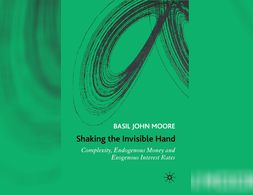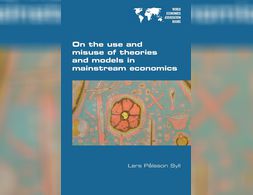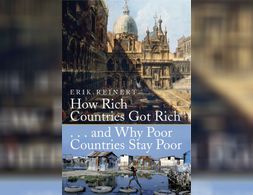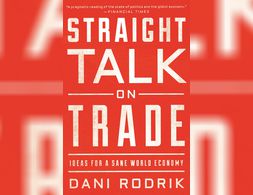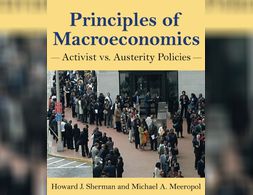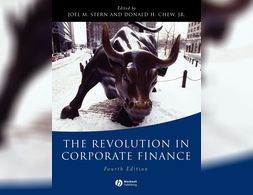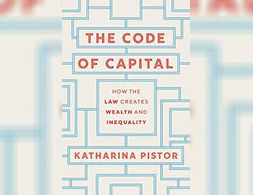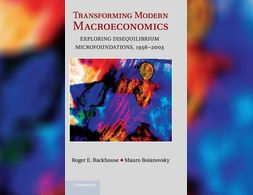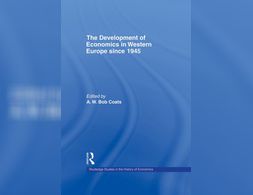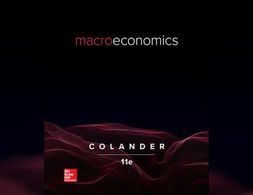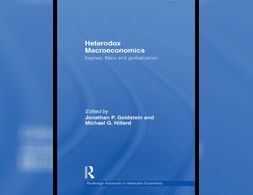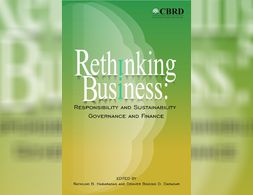✕
1055 results
More Heat Than Light is a history of how physics has drawn some inspiration from economics and also how economics has sought to emulate physics, especially with regard to the theory of value. It traces the development of the energy concept in Western physics and its subsequent effect upon the invention and promulgation of neoclassical economics.
Modern Monetary Theory and Practice: An Introductory Text is an introductory textbook for university-level macroeconomics students. It is based on the principles of Modern Monetary Theory (MMT).
This book makes the case that economies are complex systems and in response to this, develops a unique dynamic nonequilibrium process analysis of macroeconomics.
This Encyclopedia is a very first fully refereed A-Z compendium of the main principles, concepts, problems, institutions, schools and policies associated with political economy. Part 1 of a 2-volume set comprises entries from A-K.
This collection of previously published and new papers is a major intervention in the on-going debate about the nature and future of economics. Instead of the present deductivist-formalist orientation of mainstream economics, Lars Syll advocates for the adoption of a more pluralist approach to economics, arguing for more realism and relevance with less insistence on mathematical modeling.
The economics of worker cooperatives is a branch of economic inquiry with a long and esteemed pedigree, dating at least from the work of John Stuart Mill in the mid-nineteenth century.
That’s why it is time, says renegade economist Kate Raworth, to revise our economic thinking for the 21st century. In Doughnut Economics, she sets out seven key ways to fundamentally reframe our understanding of what economics is and does.
In this refreshingly revisionist history, Erik Reinert shows how rich countries developed through a combination of government intervention, protectionism, and strategic investment, rather than through free trade.
In "The Money Problem, "Morgan Ricks argues for a reform of the American monetary system. Taking up foundational questions of monetary policy, he asks: how would we construct a monetary system if we were starting from scratch? What are the characteristics of a monetary instrument?
Since the beginning of the twenty-first century, there has been an unprecedented move towards 'rethinking economics' due to the damages generated by the global financial crisis that burst in 2007-2008. Almost a decade after this crisis, policy is still unable to provide all citizens greater wellbeing or at least an encouraging economic future.
An honest discussion of free trade and how nations can sensibly chart a path forward in today’s global economy.
By focusing on the human side as well as the intellectual dimensions of how economists work and think, this collection of interviews with top economists of the 20th century becomes a startling and lively introduction to the modern world of macroeconomics.
Orthodox economics operates within a hypothesized world of perfect competition in which perfect consumers and firms act to bring about supposedly optimal outcomes. The discrepancies between this model and the reality it claims to address are then attributed to particular imperfections in reality itself.
Principles of Macroeconomics by Howard J. Sherman and Michael A. Meeropol differs from other texts in that this book stresses far more the inherent instability of the macro-economy.
Diane Perrons and Sigrid Stagl combine feminist and critical environmental economics perspectives to develop a critique of the free market growth model and offer new ideas for a more sustainable gender equitable model of development in the interests of all.
The Revolution in Corporate Finance has established itself as a key text for students of corporate finance with wide use on a range of courses. Using seminal articles from the highly regarded Bank of America Journal of Applied Corporate Finance, it gives students real insight into the practical implications of the most recent theoretical advances in the field.
The third edition of Political Economy: The Contest of Economic Ideas is a fully updated overview of the political economy and its connection with social concerns. This book investigates the main traditions of economic ideas and provides a 'big picture' overview of the analytical tools and value judgements associated with competing schools of economic thought.
Winner of the Nobel Prize in Economics
Get ready to change the way you think about economics.
Get ready to change the way you think about economics.
Nobel laureate Richard H. Thaler has spent his career studying the radical notion that the central agents in the economy are humans--predictable, error-prone individuals. Misbehaving is his arresting, frequently hilarious account of the struggle to bring an academic discipline back down to earth--and change the way we think about economics, ourselves, and our world.
Immanuel Wallerstein provides a concise and accessible introduction to the comprehensive approach that he pioneered thirty years ago to understanding the history and development of the modern world.
Despite the Doha declaration of November 2001, the failure to start a new round of global trade negotiations at Seattle in December 1999 and the hostility of protesters to the trade liberalization process and growing global economic and social disparities was a wake-up call for the World Trade Organisation (WTO).
A systematic comparison of the three major economic theories, showing how they differ and why these differences matter in shaping economic theory and practice.
Contending Economic Theories offers a unique comparative treatment of the three main theories in economics as it is taught today: neoclassical, Keynesian, and Marxian. Each is developed and discussed in its own chapter, yet also differentiated from and compared to the other two theories.
In this revealing book, Katharina Pistor argues that the law selectively “codes” certain assets, endowing them with the capacity to protect and produce private wealth. With the right legal coding, any object, claim, or idea can be turned into capital—and lawyers are the keepers of the code.
This book tells the story of the search for disequilibrium micro-foundations for macroeconomic theory, from the disequilibrium theories of Patinkin, Clower and Leijonhufvud to recent dynamic stochastic general equilibrium models with imperfect competition.
Examine what would happen if we were to deploy blockchain technology at the sovereign level and use it to create a decentralized cashless economy. This book explains how finance and economics work today, and how the convergence of various technologies related to the financial sector can help us find solutions to problems, such as excessive debt creation, banks getting too big to fail, and shadow banking.
Finance at the Threshold offers a unique perspective from an English economic and monetary historian. In it the author asks: Why did the banks stop lending to one another, and why now? Was it merely a matter of over-loose credit due to the relaxation of traditional prudence, or did global finance find itself at its limits?
Are there distinct European traditions in economics? Is modern economics homogenous and American? The volume includes case studies of the UK, Sweden, the Netherlands, Belgium, Germany, France, Italy, Portugal, Spain and Greece.
This lively introduction to heterodox economics provides a balanced critique of the standard introductory macroeconomic curriculum. In clear and accessible prose, it explains many of the key principles that underlie a variety of alternative theoretical perspectives (including institutionalist economics, radical economics, Post Keynesian economics, feminist economics, ecological economics, Marxist economics, social economics, and socioeconomics).
Colanders Macroeconomics 11e is specifically designed to help today’s students succeed in the principles of economics course and grasp economics concepts they can apply in their daily lives.
The world has changed dramatically in recent years and so has the field of economics, but many introductory economics textbooks have remained stuck in the past. This book provides a new beginning for the study of macroeconomics, fundamentally international in its approach and emphasizing current debates and research trends.
Heterodox Macroeconomics offers a detailed understanding of the foundations of the recent global financial crisis.
In a changing world that has been shaken by economic, social, financial, and ecological crises, it becomes increasingly clear that new approaches to economics are needed for both theoretical and empirical research; for applied economics as well as policy advice.
Rethinking Business is a volume of thought-provoking researches that sets out to challenge the paradigm of business along the areas of governance, finance, corporate social responsibility, and sustainability.
We use cookies on our website. Click on Accept to help us to make Exploring Economics constantly better!



